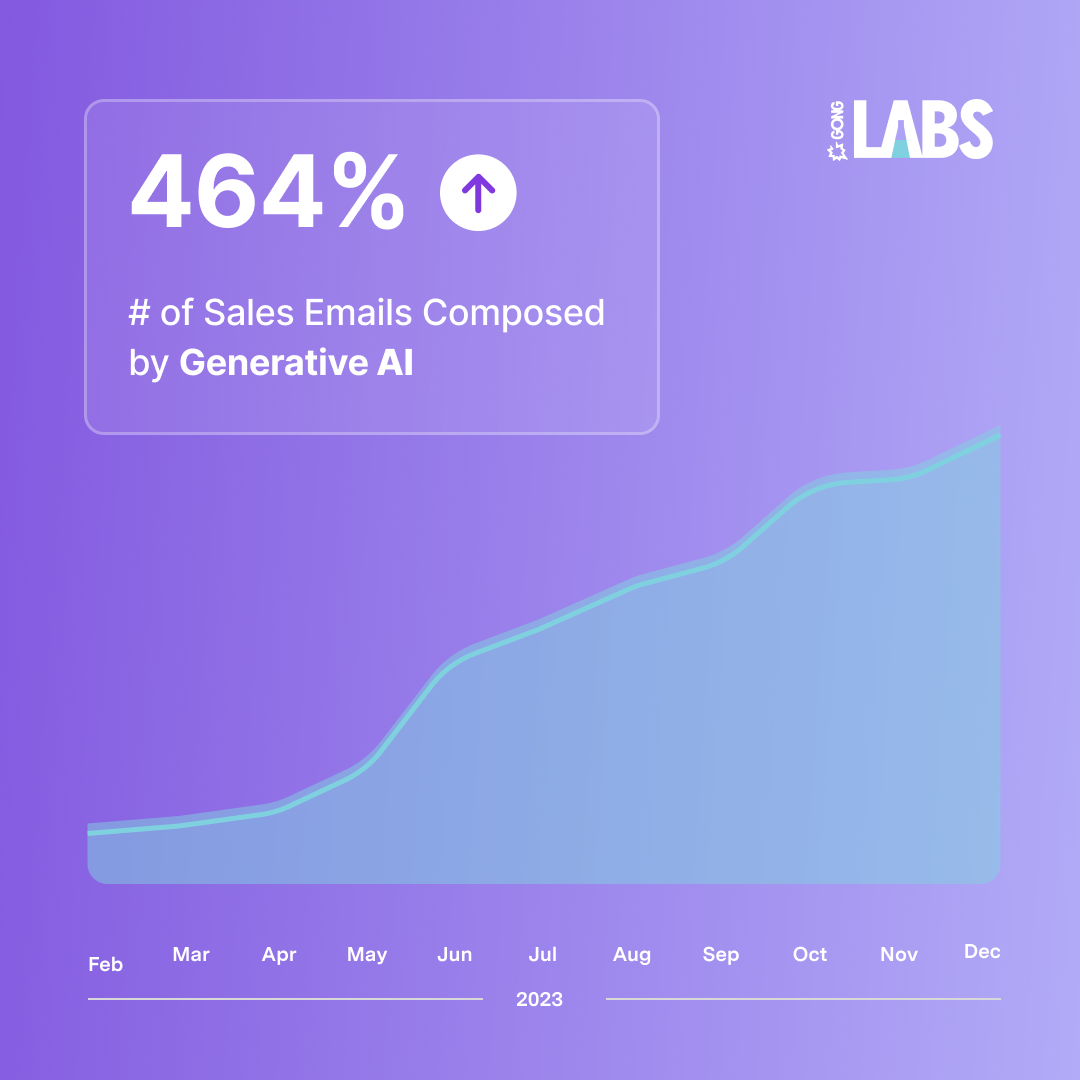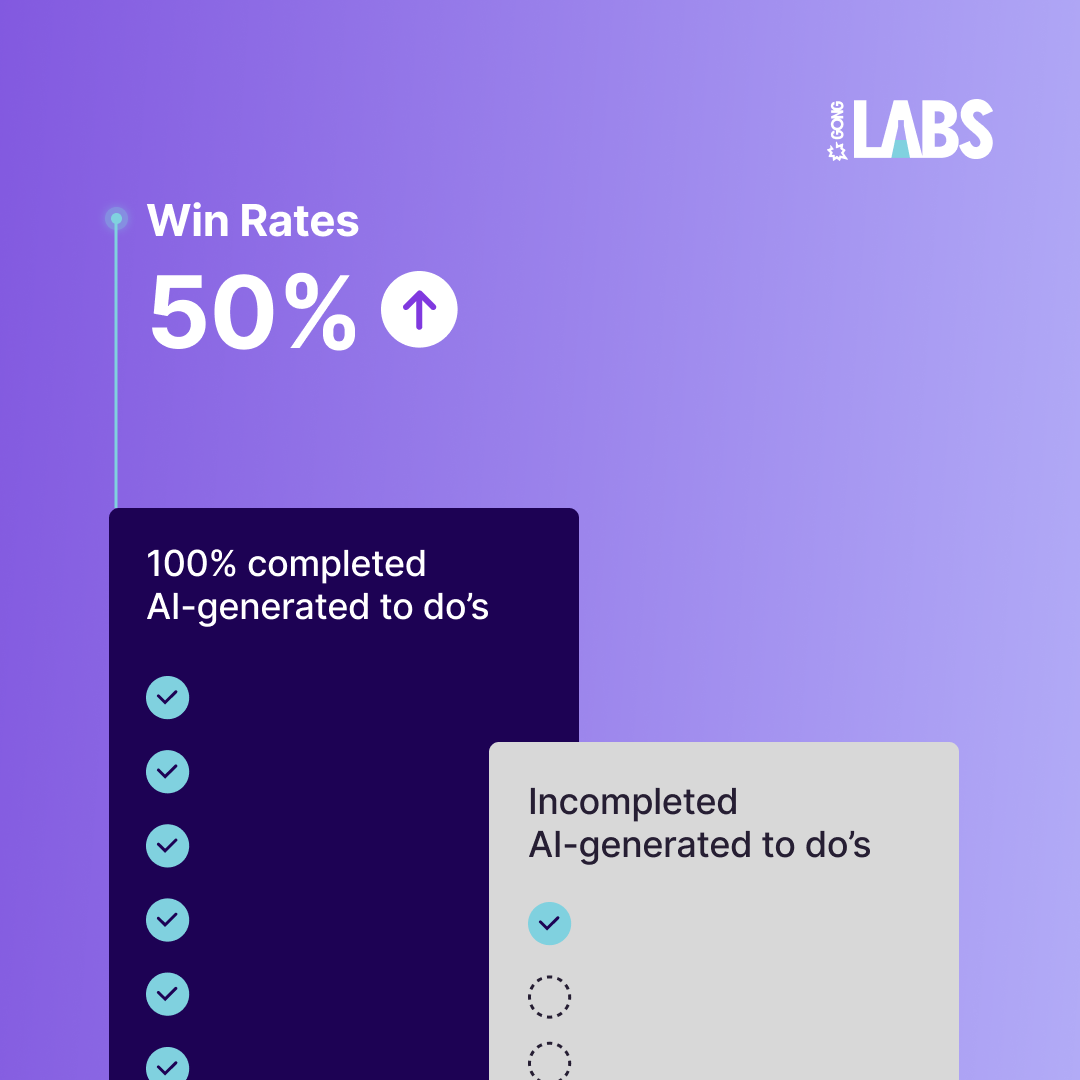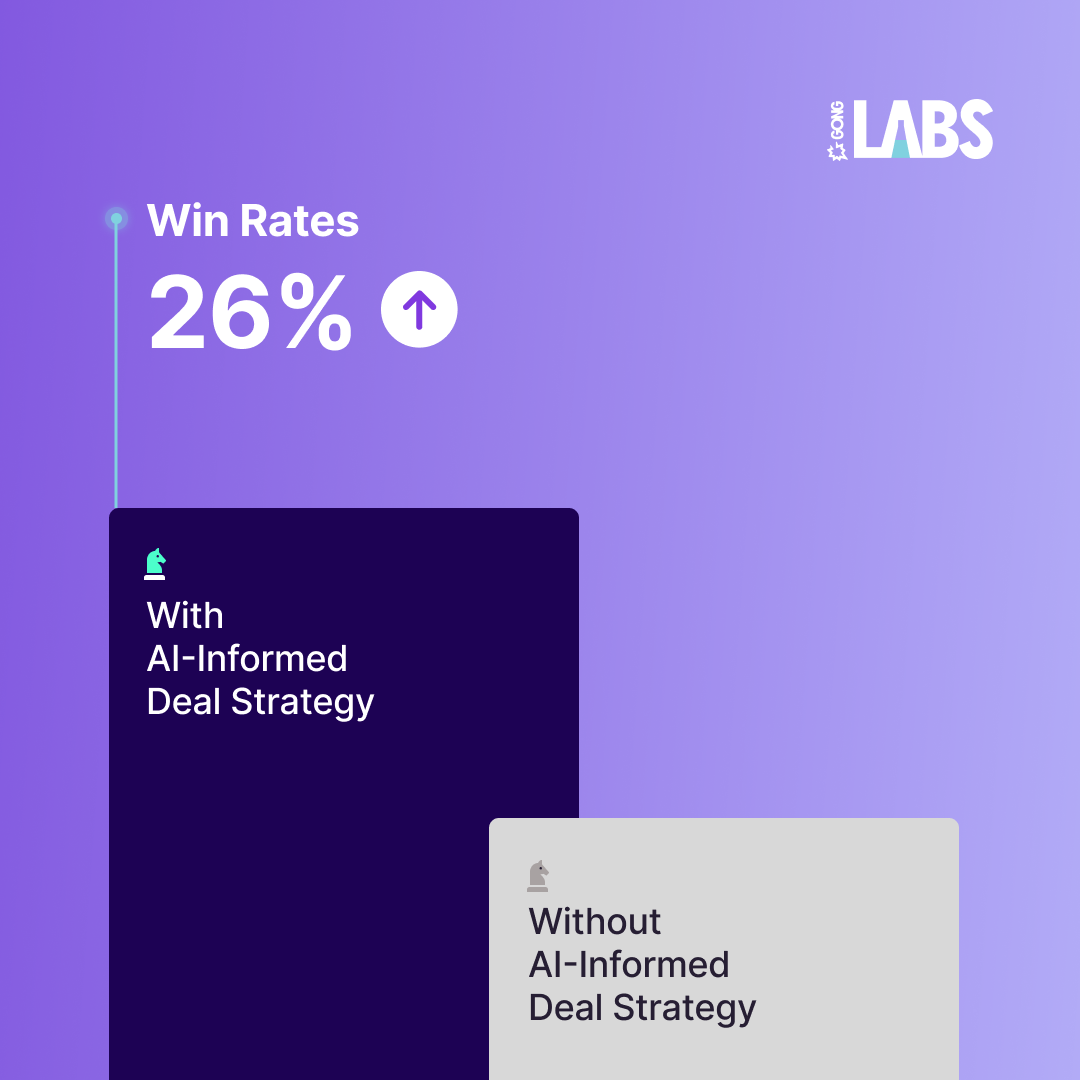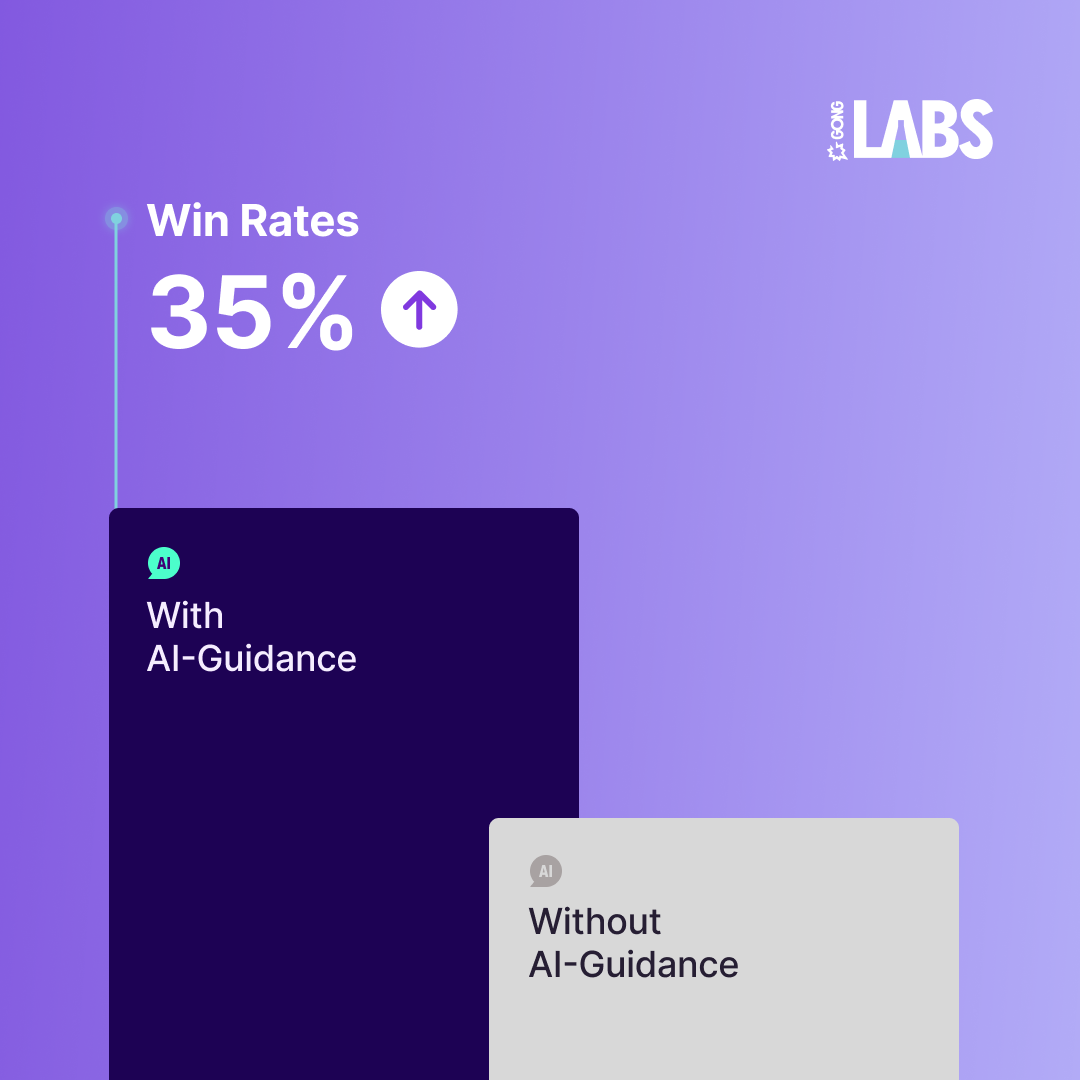How AI really affects your sales deals: ROI Insights
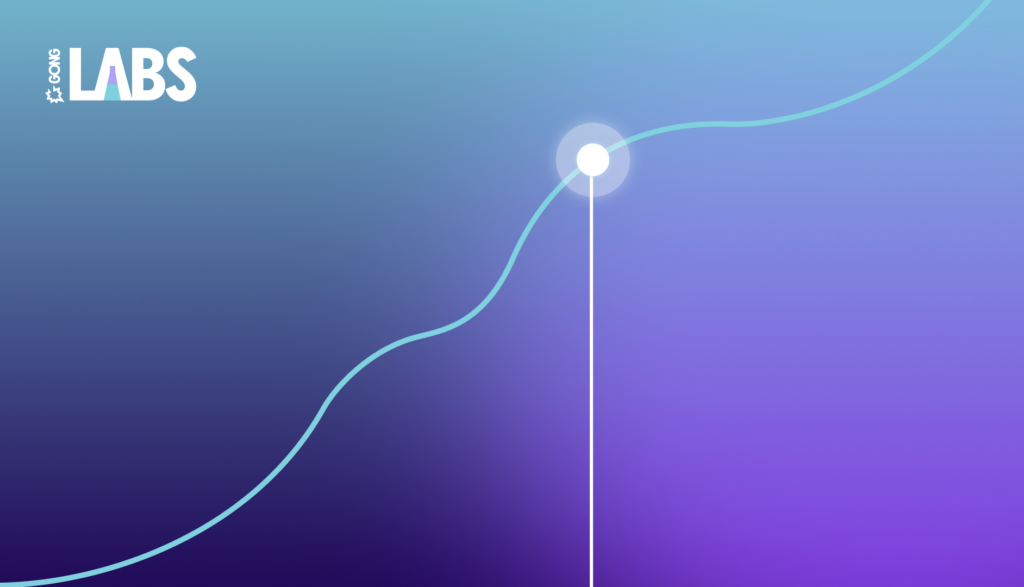
This article is part of the Gong Labs series, where we publish findings from our data research team. We analyze sales conversations and deals using the Gong Revenue Intelligence Platform’s proprietary AI, then share the results to help you win more deals. Subscribe here to read upcoming research.
Really, another article about AI?
Yes, but this one is different. So even if you’re a bit burnt out on reading about AI and its implications for your team, drive on.
This post isn’t about maybes, or possibilities, or imagined scenarios. It’s about the very real data we uncovered on how AI affects your revenue team and how you can use AI to your advantage.
Let’s start with this one:
Sales conversations about AI have increased 2200% since November 2022.
In fact, since ChatGPT’s launch announcement, we’ve seen 23x the number of sales conversations about how AI has changed the landscape for buyers, as well as the offers they consider.
In early conversations, you’d hear a lot of “what-ifs” and hypothetical questions from customers about what’s really possible with AI. A little over a year later and AI has worked its way into sellers’ daily workflows.
Not surprisingly, we wanted to determine the true impact AI is having on sellers’ success. So we pulled together data to learn what AI really means for revenue teams, and identified the best use cases for early adopters.
For this analysis, Gong Labs analyzed more than 1M sales opportunities across 1,418 sales organizations that currently use one or more AI features in Gong. Deals of all sizes were included in the study where the duration was greater than 7 days. We then determined differences in win rates by comparing deals where the sales team used AI functionality against those that didn’t use AI.
While this study is isolated to Gong users, these adoption and performance numbers signal broader trends about where AI provides the most value to revenue teams.
Here’s what we found.
It’s official. Generative AI is increasing sales rep productivity.
Gartner estimates that by 2028, AI will generate 30% of all outbound communications.
Our analysis shows that revenue organizations are well on their way to hitting this mark.
Proof point: Since February 2023, there has been a 464% increase in the number of emails teams compose using Gong’s generative AI.
Gong’s email composer is trained on domain-specific data captured by revenue intelligence to produce sales emails that are tailored to individual buyers, activities, and opportunities. For example, following a sales call, a rep can generate a follow-up email in a single click, and it will include the relevant topics that were discussed, bulleted action items, and agreed-upon next steps.
This use case is having an incredible impact on sellers’ productivity. In Gong’s State of Sales Engagement study, reps told us they spend an average of 12.1 hours each week writing emails. They spend about half of this time customizing pre-written templates and another 6.2 hours writing emails from scratch. Forrester’s early estimate on gen AI’s impact is a productivity increase of approximately 50%, potentially freeing up six hours or more for a rep each week.
Here’s where to start: Increase the efficiency and effectiveness of your sellers by identifying mundane and time-consuming tasks you can easily automate with AI. This could include note taking, drafting follow-up emails, or auto-populating fields in systems like your CRM. By freeing up time in these areas and surfacing action items, you let reps focus on high-value activities and improve their response times.
Sellers who use AI to Optimize their activities increase win rates by 50%.
As technology gives time back to teams, reps need to determine how to spend that time. Luckily, AI can also recommend and prioritize reps’ next-best-actions.
In a previous Gong Labs study, 45% of reps told us that one or more of their critical action items slipped through the cracks each week. Gong Engage helps prevent this from happening by recommending to-dos for sellers based on the activities that occur throughout their deals.
Actioning these AI-generated notifications — like email follow-ups, prospect nudges, and meeting confirmations — shortens the deal cycle and increases win rates. In fact, average win rates increased by a whopping 50% in deals where reps completed all their AI-recommended to-dos compared with those who didn’t complete their action items.
Here’s where to start: Seek out solutions that can prioritize and automate common selling workflows. As your teams increase their selling capacity with AI, coordinating and orchestrating all touchpoints throughout becomes more complex. This makes identifying a seller’s next-best action all the more important. Our research shows seller responsiveness is a leading indicator of success by increasing win rates and shortening deal duration.
Sellers who use AI to inform their deals increase win rates by 26%.
Deals continue to grow in complexity. Buying groups are larger, sales cycles are longer, and executive stakeholders are more involved in purchasing decisions than ever before. All things considered, it’s never been more critical for reps to identify when and where they can provide value.
For years this meant reps spent considerable time researching their accounts, preparing for calls by reviewing notes, and strategizing with their leaders and co-selling teams during meetings.
The introduction of generative AI to these processes has been a game-changer for early adopters. For example, Gong customers have access to “Ask Anything” on deals and accounts, where users can find research about their customers and vital information that moves deals toward the finish line. By instantly generating these insights, sellers free up time to engage with buyers while getting a deeper understanding of where their opportunities stand.
It’s not just reps getting valuable insights while saving time. Without AI, sales managers spend a significant number of hours each week analyzing their team’s opportunities.
The average deal takes eight or more customer touchpoints to close. Before this AI functionality, managers had to skim through volumes of calls, emails, and CRM data to get up to speed.
With AI, managers can now use quick-start prompts or ask custom questions to quickly analyze an opportunity and determine how to best enable their reps. The result is focused, impactful coaching that drives higher win rates.
When Gong’s Ask Anything function is used in a deal, win rates increase by 26%.
Here’s where to start: Closing a deal takes a village. It’s very rare that a single rep creates and closes an opportunity on their own. AI can enhance collaboration and team selling by providing the entire group — including sellers, sales engineers, solutions specialists, and more — with visibility into critical information about their buyers, accounts, and opportunities. It keeps everyone well-informed and connected throughout the lead-to-close process.
Sellers who use AI to guide their deals increase win rate by 35%.
One of AI’s most distinguishing capabilities is that it can process and understand large volumes of data.
When Gong introduced conversation intelligence in 2015, it gave revenue teams the ability to capture and transcribe every customer-facing interaction and unlock an invaluable dataset that made sellers better at their jobs.
Today, using conversation intelligence data, AI can surface key moments that occur in customer interactions throughout a deal cycle. It can highlight competitive mentions, pricing objections, cross-sell opportunities, and more. With these insights at their disposal, sellers can adapt their sales strategies in real time or remove obstacles before deals are at risk. Insights can also highlight coaching opportunities for managers or give leadership more visibility into how strategic initiatives perform.
Gong users can unlock this AI capability using Smart Trackers, AI models that are trained to identify concepts (not keywords) by assessing words, sentence structures, and contexts. For example, if you track the concept of “asking for a discount,” a Smart Tracker will surface mentions such as “Can we get a better price?” and “What’s the best deal?”
When sellers used this AI functionality, their win rate was 35% higher.
Here’s where to start: AI is only as good as the data sources it learns from. When you start implementing AI across your revenue teams, be sure your tools are built on comprehensive and domain-specific data. From there, determine the key signals or moments in deals that you’d like to surface for your team. These insights can increase the adoption of large initiatives, enhance coaching, and increase seller effectiveness.
AI won’t replace sales reps, but sales reps who use AI will replace those who don’t.
While it’s still early days, we’ve already seen AI completely transform how revenue teams go to market.
If you’re not leveraging AI or haven’t yet realized its full potential, let’s talk.
Or if you’re looking for more inspiration, we just released our latest innovation webinar. Hear from Gong’s SVP of Product Marketing, Kevin Murray, on how to reshape critical revenue workflows and super-charge productivity, predictability, and growth with AI. You’ll also get a chance to see how the concepts discussed in this article are put into action with a live demo of Gong’s latest features.
Watch it on demand here and start powering your team with AI today.
